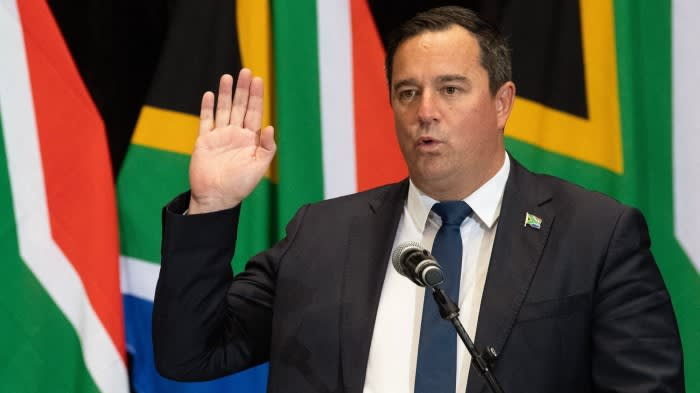South Africa’s unity government is holding together six weeks after it was formed, boosting business confidence and raising hopes that its two main parties can forge a longer-term working relationship.
“I’m actually quite surprised by how well it’s going,” John Steenhuisen, leader of the Democratic Alliance, which joined the coalition following May’s general election, told the Financial Times. “I thought there’d be a lot more pitfalls.”
The African National Congress lost its majority in the election for the first time since 1994, and formed the unity government with the DA and nine smaller parties.
“The DA is now part of the cabinet and I’ve been surprised by how many smart people are around that table working hard to achieve the same things we want,” Steenhuisen said.
Despite some signs of tension, including a public spat with Helen Zille, the DA chair who is loathed by some ANC officials, the relatively smooth start has encouraged investors.
Busi Mavuso, chief executive of Business Leadership SA, which represents the country’s largest companies, said the momentum had cheered business. “Already bond yields have dramatically fallen, and the government can now borrow at rates 10 per cent lower than before the election,” she said.
JPMorgan has upgraded South Africa to “overweight” on the expectation of increased investment into the country, while the Johannesburg Stock Exchange has gained 6.5 per cent in the past two months and the rand has risen more than 2 per cent against the dollar to about R18.30.
Businesses have also taken comfort from the fact that electricity power cuts have not returned since the election, adding weight to claims by Eskom, the state-owned power utility, that it has definitively ended the blackouts that plagued the economy for several years. That improvement has added to confidence the government can solve other long-running problems, particularly in ports and roads.
“The difference we’ve seen in just a few weeks is immense,” said Johnny Copelyn, chief executive of Hosken Consolidated Investments, a Black-owned investment company with stakes in sectors including broadcasting, hotels and energy.
“Before the election, many government departments would just ignore you. Now, phone calls are returned and things are being done. It makes me optimistic that we’ve turned the corner.”
Many expected friction between the market-oriented DA and the redistributionist ANC, but coalition participants say a sense of pragmatism is prevailing.
“It’s just about holding together right now,” said Songezo Zibi, leader of Rise Mzansi, one of the smaller parties in the unity government.
“The impact of the electoral loss in the ANC is palpable, and there are some in that party who understand that if they behave as they did before the election, it’s [the end] for them. They would then be looking at 25 per cent in the 2029 election,” he added, referring to the ANC’s slide to 40 per cent in the May election.
Zibi, a former newspaper editor who was elected chair of the powerful parliamentary committee overseeing public accounts, said the DA was essential to the new government’s success.

“Without the DA, this government collapses. But from what I’ve seen so far, the DA has held the line and maintained its identity, while making it clear they are committed to this arrangement,” he said.
It has not been all plain sailing. Zille has sought to lay bare the ANC’s dependency on the DA, saying last month that she could not pretend she was part of a unity government, since larger parties such as Jacob Zuma’s uMkhonto weSizwe party were excluded.
The ANC bristled at the remarks, with secretary-general Fikile Mbalula saying: “If she wants to leave the government of national unity, she can.”
Steenhuisen, who has been given the role of agriculture minister, said disagreements had not prevented the new government from getting things done. The DA home affairs minister Leon Schreiber had issued visa extensions for foreigners with scarce skills, he said, while public works minister Dean Macpherson had imposed a ban on government renting new offices as a way of curbing wasteful spending.
S&P Global Ratings analyst Zahabia Gupta said it was too early to upgrade the country’s debt, though she was encouraged by the early start. “This government is still new, so there are still questions over how stable this coalition will be when points of disagreement emerge,” she said. “We would want to see momentum on the implementation of structural reforms.”
The rating agency expects GDP growth of 0.9 per cent this year, rising to an average of 1.3 per cent over the next three years.
Rise Mzansi’s Zibi said finance minister Enoch Godongwana’s budget in October would be key to assessing whether priorities had really shifted.
“That will provide the first real empirical sense of the change of direction, as it will reveal the fiscal commitments, which will show what this government is serious about,” he said. “The signs are positive, but people want to see the fruits of this change.”
Additional reporting by David Pilling in London
This article was originally published by a www.ft.com . Read the Original article here. .


